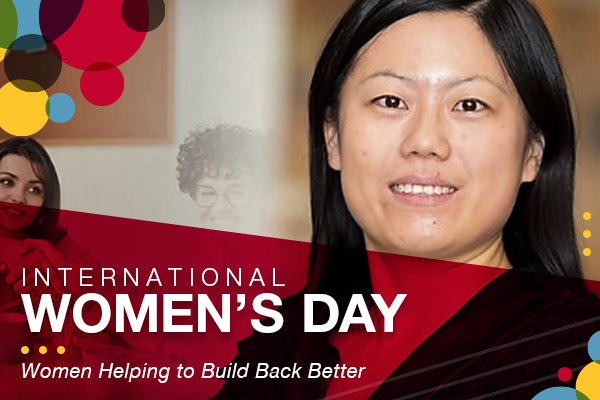 The pandemic has eroded hard-fought gains toward gender equality in the Canadian workforce, with women experiencing career setbacks due to increased childcare and household duties and with part-time women workers hit hard by layoffs.
The pandemic has eroded hard-fought gains toward gender equality in the Canadian workforce, with women experiencing career setbacks due to increased childcare and household duties and with part-time women workers hit hard by layoffs.
But on this year’s International Women’s Day, a University of Guelph expert in sustainability accounting argues women can play a leading role in “building back better” as Canada’s economy recovers from COVID-19.
Dr. Jing Lu, an accounting professor in the Department of Management, believes corporate sustainability will be essential to a smart recovery and women can make important contributions.
Lu’s research found that companies and organizations with more women on their boards of directors score higher on corporate environmental performance than those with less diversity. The finding was particularly significant in industries with the greatest environmental impact, such as oil and gas and other resource extraction industries.
“Women and men tend to have different perspectives on environmental issues, and my research suggests it’s important to have a mixture of those perspectives on boards,” Lu said. “Women provide a broader view on sustainability when they contribute to the strategic development of corporate environmental strategies.”
Increasing the number of women in these important decision-making roles on boards of directors could be key to guiding companies to more sustainable recovery, said Lu.
With this year’s International Women’s Day theme focusing on the efforts women and girls around the world in shaping a more equal recovery from the COVID-19 pandemic, the issue is more relevant than ever.
What’s more, with growing evidence that more socially responsible companies perform better financially, there is strong incentive for firms to think green as they recover.
“It’s become clear that our society cares about environmental sustainability. A growing number of investors – whether they are individuals or large pension funds and mutual funds – are telling these companies they want to be responsible investors and will walk away from companies that don’t improve their environmental performance,” said Lu.
Consumers, too, are sending a message they will stop supporting businesses that shirk their environmental responsibilities. Even lenders want to see strong sustainability performance reports and compliance with environmental regulations, she added.
“So, there is pressure on these boards, and women board members tend to bring that perspective to the forefront.”
But to increase gender diversity on boards of directors, Lu believes changes need to be made at the societal level.
“The reality is that women still feel the pressure to tend to most of the child rearing and family care, even when they have full-time jobs,” she said. “So even though many have the potential to offer important contributions to these boards, they often cannot find the time.”
What’s more, when women pause their careers for families, they lose opportunities to gain experience and expertise and can appear less qualified than men when they apply for board positions.
If there is to be a #feministrecovery from the pandemic, as promoted by Canada’s Department for Women and Gender Equality, Lu said she would like to see more ways to encourage women into these decision-making roles. This can be achieved by fostering more mentorship for prospective women directors and more corporations pledging to increase the gender diversity of their boards, she added.
“The pandemic has caused much social and economic disruption but offers the opportunity to reimagine the role of women in these important corporate positions.”
Contact:
Dr. Jing Lu
jlu11@uoguelph.ca